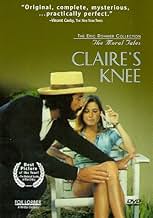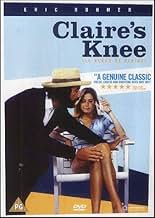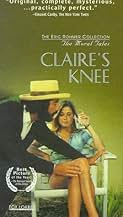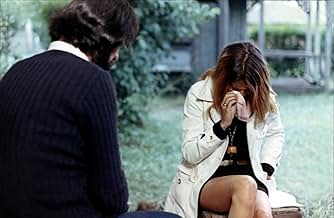On lakeside summer holiday, a conflicted older man is dared to have a flirt with two beautiful teenage half-sisters despite his betrothal to a diplomat's daughter and the fact that the girls... Read allOn lakeside summer holiday, a conflicted older man is dared to have a flirt with two beautiful teenage half-sisters despite his betrothal to a diplomat's daughter and the fact that the girls have boyfriends.On lakeside summer holiday, a conflicted older man is dared to have a flirt with two beautiful teenage half-sisters despite his betrothal to a diplomat's daughter and the fact that the girls have boyfriends.
- Awards
- 6 wins & 4 nominations total
- Director
- Writer
- All cast & crew
- Production, box office & more at IMDbPro
Featured reviews
The title of this charming film by Eric Rohmer is perhaps too provocative. It really gives the wrong impression, yet Claire's knee is exactly the central point of the film, although in a way that will surprise you. This is the story about a thirty-something year old diplomat, Jerome Montcharvin, who encounters two pretty girls, sixteen and eighteen years old, while on vacation at Lake Annecy in France (near Lake Geneva, Switzerland) a month before his wedding and finds that they affect him more strongly than he might have expected. It is especially Claire who brings out a side of his personality that is seldom exposed, much to the merry interest of his friend, Aurora, a writer, who has guided his interest in the girls, ostensibly as material for a story she is writing. Claire's Knee, it need be said immediately has not so much to do with the pretty girl's knee as it has to do with the protagonist's self-perception. Jean-Claude Brialy, who plays Jerome Montcharvin, brings a veracious mix of smug confidence and little guy vulnerability to the part spiked with a clear case of self-delusion that illuminates his character very well. And the girls are indeed very pretty, with Laura, played with coquettish innocence by Béatrice Romand, also being clever and slyly sophisticated, vulnerable and honest. In contrast Claire, played by Laurence de Monaghan, whose fawn-like beauty is perfect for the part, seems superficial and ordinary and a bit distant. I found myself more attracted to Aurora, played with a gentle and understated irony by Aurora Cornu. She provides the objectifying point of view for us to realize that while Jerome imagines he is a man in touch with his feelings and has an objective understanding of himself, he is really a man who fools himself about his motivation, a man who can be ugly when frustrated, as he is by Claire's lack of interest in him. The dialogue, written by director Eric Rohmer, which some have found excessive is anything but. It is instead clever and witty and at times profound as Rohmer relentlessly explores the nature of love, sex, sensuality and self-delusion. The cinematography of the lake and the French alps in the summer time is luscious, and the privileged, softly indulgent life style of the characters living around the lake provoked a twinge of jealousy in my soul. This is a beautiful film, worldly wise, warm, sensual and subtle as a dinner by candlelight.
A self-possessed, fortyish man of the world, on the verge of marriage, summers by the seaside, where his lust fixates on a wised-up nymphet who won't have him. Unsated, his desire moves on to her blank-faced sister--or rather, the sister's lithe, tennis-playing knee.
As always in Rohmer, the audience is cautioned to check its head in the opening scenes; we are forced to dial down to a level of attention where the nuances of conversational game-playing, phony retractions and crafty grabs at checkmate, are the only blips on our radar screen. The way Nestor Almendros photographs it, the seaside locations are so sumptuously sexual they're almost pornographic; they give the genteel proceedings a pregnancy, as if Hitchcockian mayhem is on the verge of eruption. It isn't; but the climax tells a different story from the rest of this cool, crickety, blithe picture--an ominous, O. Henryish one about the price of unfulfilled male desire.
I took a look at CLAIRE'S KNEE on the occasion of the almost-eighty-year-old Rohmer's latest picture, AN AUTUMN TALE, to see how the canon held up--is Rohmer what he seems to be, a sadder-but-wiser op-ed columnist on the subject of love intrigue? Or is he the "tasteful" poet of leetle-girl lechery? I am cynically leaning toward the latter, perhaps because I'm put off by scenes in which French males nod with ironic agreement as their little cherry pie intones earnestly, "Really, I'm a very old soul." Rohmer even has a menopausal (and hence genially washed-up) female watching the fortyish roue's frustrations with a classically Gallic laugh at the human comedy of it all. Rohmer's "tolerance" has an instructional, Old Wave fuddiness about it. And the ending--in which the roue's cruelty is undone by the innocence of youth, as if teenage girls were infants forgetting they had just fall down go boom--is creepy, like a self-reassuring entry in Humbert Humbert's journal.
But Rohmer deserves his due: he's as acute a journalist of move and countermove--some of them unconscious--as Marivaux. Unfortunately, like Marivaux, Rohmer suffers from excess courtliness. One yearns for entropic real life to drool down the sides of his porcelain.
As always in Rohmer, the audience is cautioned to check its head in the opening scenes; we are forced to dial down to a level of attention where the nuances of conversational game-playing, phony retractions and crafty grabs at checkmate, are the only blips on our radar screen. The way Nestor Almendros photographs it, the seaside locations are so sumptuously sexual they're almost pornographic; they give the genteel proceedings a pregnancy, as if Hitchcockian mayhem is on the verge of eruption. It isn't; but the climax tells a different story from the rest of this cool, crickety, blithe picture--an ominous, O. Henryish one about the price of unfulfilled male desire.
I took a look at CLAIRE'S KNEE on the occasion of the almost-eighty-year-old Rohmer's latest picture, AN AUTUMN TALE, to see how the canon held up--is Rohmer what he seems to be, a sadder-but-wiser op-ed columnist on the subject of love intrigue? Or is he the "tasteful" poet of leetle-girl lechery? I am cynically leaning toward the latter, perhaps because I'm put off by scenes in which French males nod with ironic agreement as their little cherry pie intones earnestly, "Really, I'm a very old soul." Rohmer even has a menopausal (and hence genially washed-up) female watching the fortyish roue's frustrations with a classically Gallic laugh at the human comedy of it all. Rohmer's "tolerance" has an instructional, Old Wave fuddiness about it. And the ending--in which the roue's cruelty is undone by the innocence of youth, as if teenage girls were infants forgetting they had just fall down go boom--is creepy, like a self-reassuring entry in Humbert Humbert's journal.
But Rohmer deserves his due: he's as acute a journalist of move and countermove--some of them unconscious--as Marivaux. Unfortunately, like Marivaux, Rohmer suffers from excess courtliness. One yearns for entropic real life to drool down the sides of his porcelain.
Well, I came across this movie while reading Roger Ebert's Awake in the dark and thankfully was able to get a chance to get a hold of Éric Rohmer's masterpiece Claire's Knee. I hadn't read Ebert's review (usually I watch a movie before going through the reviews) so was not sure what was I going into - haven't watched any trailer as well so I was not sure what this would be about, but with my experience with foreign movies I was sure it would be good and I guessed by the name that it suggested something like Lolita or many other movies based on such abnormal (sometimes immoral) desires.
So, when you start with the movie you are somewhat aware where this is going - the expected storyline basis the title- but soon comes to these well-performed characters and while getting engrossed in the discussions between characters on love, choices, life, etc. you get more understanding on the way each of them sees the world - what they desire? what they like? and why they do so? The great part with such discussion was that first, it didn't go into a preachy tone- that x is right and y is not, each of them had their views which they justified by their past or by their behavior - it reminded me of the Before trilogy and, second, while listening to such great lines, one start thinking and contemplating of one's own stand on the topic of love, moral & desires.
There is a scene where the protagonist talks about a notion where he as a person do not have desires on the beauty aspect of women but because of a character his friends ask him to play, he started thinking like that character, and somewhere knowingly or unknowingly he too as a person starts to have those desires. The beauty of this notion is that this happens to the viewer as well, you don't look at claire's knee or her in that sense- but because the movie tells you that this is important - this is beautiful - and to be desired you look for it in that passionate way. You too, play the character in the movie.
So, when you start with the movie you are somewhat aware where this is going - the expected storyline basis the title- but soon comes to these well-performed characters and while getting engrossed in the discussions between characters on love, choices, life, etc. you get more understanding on the way each of them sees the world - what they desire? what they like? and why they do so? The great part with such discussion was that first, it didn't go into a preachy tone- that x is right and y is not, each of them had their views which they justified by their past or by their behavior - it reminded me of the Before trilogy and, second, while listening to such great lines, one start thinking and contemplating of one's own stand on the topic of love, moral & desires.
There is a scene where the protagonist talks about a notion where he as a person do not have desires on the beauty aspect of women but because of a character his friends ask him to play, he started thinking like that character, and somewhere knowingly or unknowingly he too as a person starts to have those desires. The beauty of this notion is that this happens to the viewer as well, you don't look at claire's knee or her in that sense- but because the movie tells you that this is important - this is beautiful - and to be desired you look for it in that passionate way. You too, play the character in the movie.
This is one of the best movies of Rohmer's earlier series of moral tales. The movie wonderfully depicts the complicated relatioship between the hero and his desires, represented by Claire, and the reality of Claire's younger sister, who as masterfully played by Beatrice Romand. This is a wonderful comedy of manners, in which we can laugh at all the characters, how in their attempts to fool others, they only fool themselves. Rohmer has intricately plotted every action, I enjoyed every moment of the film.
I think the moral point of "Claire's Knee" (probably not Rohmer's) is that Jerome's conversion from womanizer to a serious and challenging relationship with Lucinde, is flawed. And that the flaw is his invoking the escape hatch of an "open marriage." He (or his new persona) half believes that he will not use it, but the accidental presence of two enticing teenagers at his Lake Annecy vacation sets the stage for his self-delusion, his devaluation of intimacy, and for the resurfacing of his sensuous ways.
For "open marriage" as a cover for "adult," is really another form of ambivalence and duplicity. What it means to Jerome is that the door of puerile fantasy is at his fingertips. Thus in the rarified air of Annecy, in the flow of summer, thin, mod teenagers Laura and Claire become not only sex objects to Jerome, but potential love partners--one at 16, assessed as adult enough, and the other 18, assessed as legal. We see them together, he invariably clothed for late autumn weather, they for mid-summer. In the emotional cat and mouse games that ensue, Laura and Claire are, to him, mere temptresses, and perhaps part of a self-test, and not, in any sense, young women with lives of their own & chosen boy friends. Instead, their boundaries begin to blur under his voyeurism, his not so subtle acts of aggression, his familiar touching, fondling, pointed remarks, and prescriptive suggestions. He offers them no affection, no friendship, and no communication.
How could it be otherwise given their demure youth, beauty and his permissive "open marriage," and when possessing them is his goal--pederasty and fetishism his means. But his fling with inspiring youth having fulfilled his KNEEDS, he can now discard Laura and Claire without in any way having deviated from his new mature male role-- as willfully possessive as he's been. Whether Lucinde has actually signed off on the "open" deal or not, she, despite her maturity, worldly success, and her sculptured character, must be no more than a symbol to Jerome, extracted for his KNEEDS, which must come first before commitment and support.
For "open marriage" as a cover for "adult," is really another form of ambivalence and duplicity. What it means to Jerome is that the door of puerile fantasy is at his fingertips. Thus in the rarified air of Annecy, in the flow of summer, thin, mod teenagers Laura and Claire become not only sex objects to Jerome, but potential love partners--one at 16, assessed as adult enough, and the other 18, assessed as legal. We see them together, he invariably clothed for late autumn weather, they for mid-summer. In the emotional cat and mouse games that ensue, Laura and Claire are, to him, mere temptresses, and perhaps part of a self-test, and not, in any sense, young women with lives of their own & chosen boy friends. Instead, their boundaries begin to blur under his voyeurism, his not so subtle acts of aggression, his familiar touching, fondling, pointed remarks, and prescriptive suggestions. He offers them no affection, no friendship, and no communication.
How could it be otherwise given their demure youth, beauty and his permissive "open marriage," and when possessing them is his goal--pederasty and fetishism his means. But his fling with inspiring youth having fulfilled his KNEEDS, he can now discard Laura and Claire without in any way having deviated from his new mature male role-- as willfully possessive as he's been. Whether Lucinde has actually signed off on the "open" deal or not, she, despite her maturity, worldly success, and her sculptured character, must be no more than a symbol to Jerome, extracted for his KNEEDS, which must come first before commitment and support.
Did you know
- TriviaNot counting a picture frame seen from a distance, the title character's first appearance takes place 47 minutes into the film.
- GoofsNear the end of the movie, Jerôme and Claire Annecy are going by boat to Annecy but must seek refuge under a shelter because of a storm. During their conversation, the irregular flow of the watering device used to create the big rain can be heard clearly.
- ConnectionsEdited into 365 Days, also Known as a Year (2019)
Details
Box office
- Gross worldwide
- $5,112
- Runtime
- 1h 45m(105 min)
- Sound mix
- Aspect ratio
- 1.37 : 1
Contribute to this page
Suggest an edit or add missing content

![Watch Bande-annonce [OV]](https://m.media-amazon.com/images/M/MV5BMTgyOTk2NmMtZTk3ZS00Yjg4LWIwMzEtM2RmZDQ0ZWVhZWUzXkEyXkFqcGdeQXRyYW5zY29kZS13b3JrZmxvdw@@._V1_QL75_UY281_CR10)

























